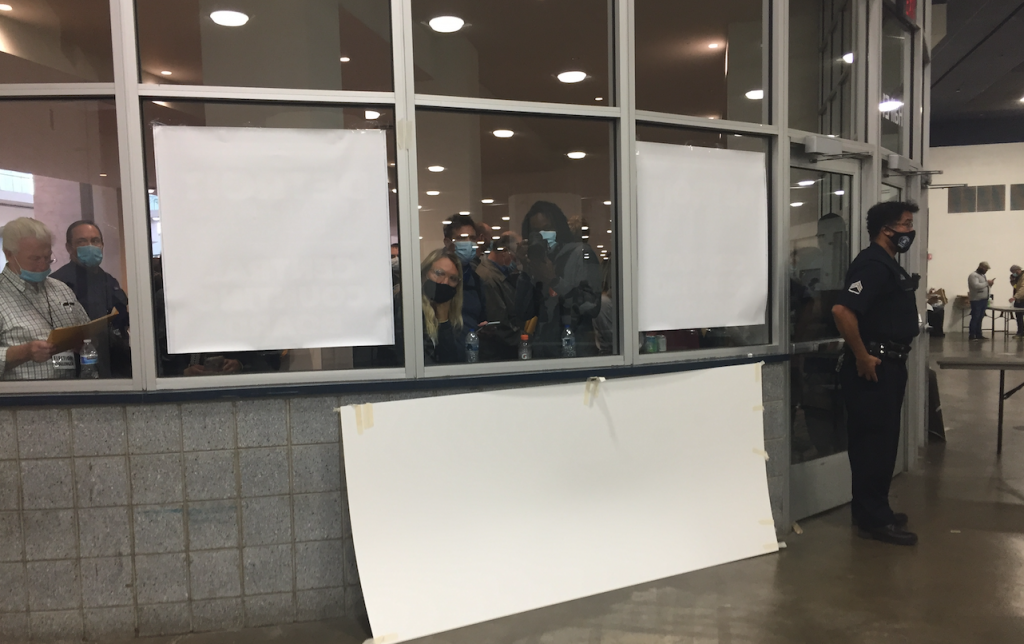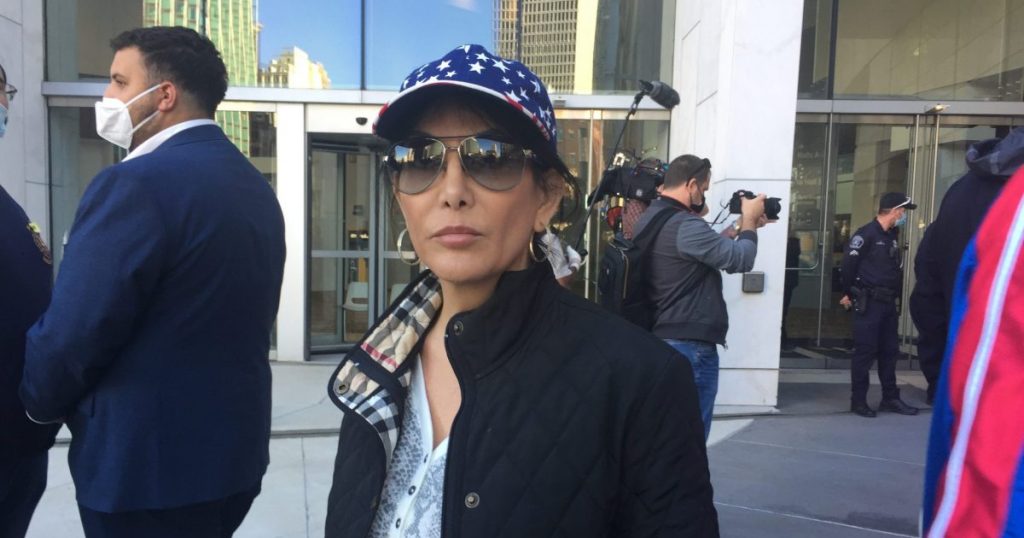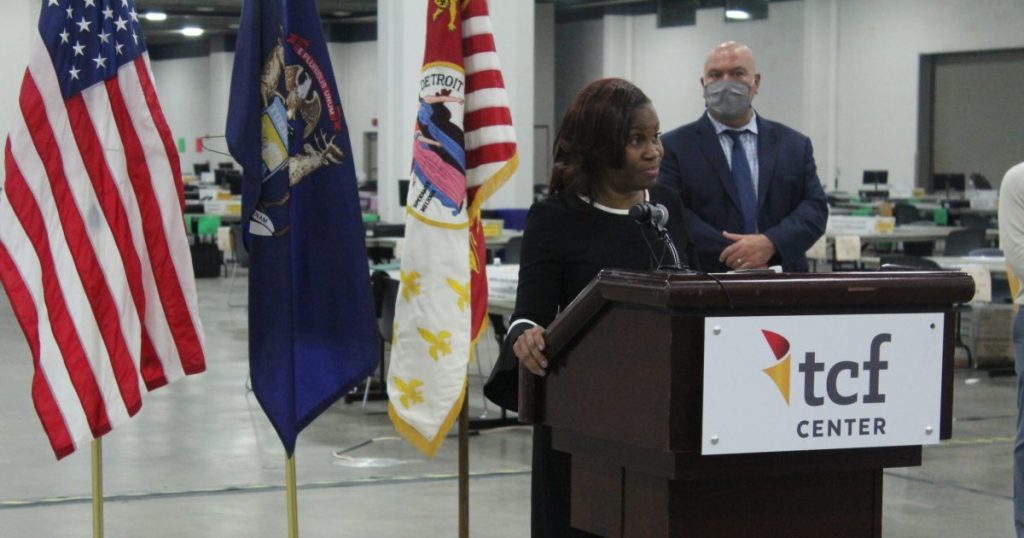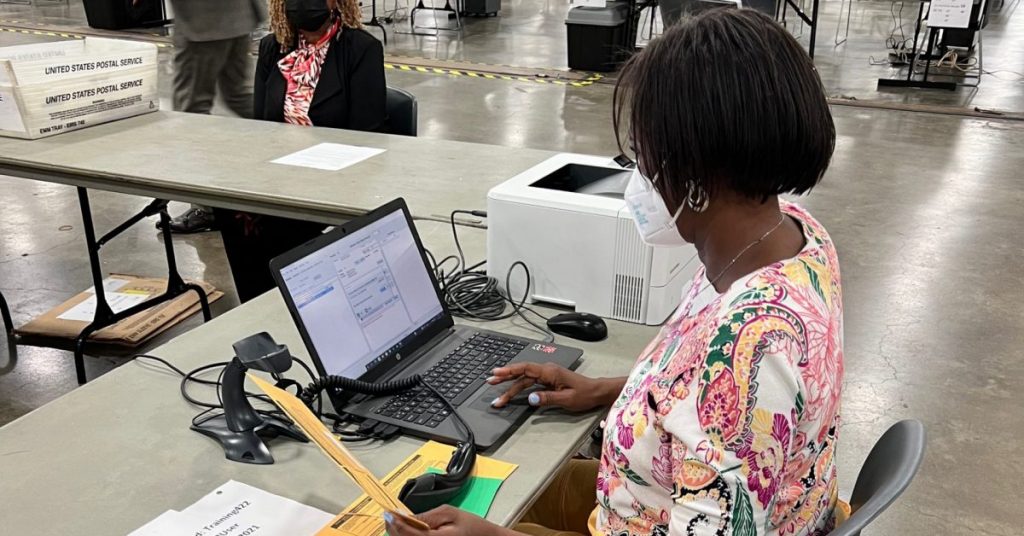CuriosiD: Are Detroit election officials prepared for another ‘stop the count’ protest?
Russ McNamara, Patrick Bernas October 13, 2022With the midterm elections around the corner, what is the city of Detroit doing to secure ballot counting at Detroit’s convention center?

Protesters at the TCF Center during the 2020 elections. Photo Credit: Laura Herberg, WDET
WDET’s CuriosiD series answers your questions about everything Detroit. Subscribe to CuriosiD on Apple Podcasts, Spotify, NPR.org or wherever you get your podcasts.
In this episode of CuriosiD, listeners asked…
“What security will be in place at Huntington Place for poll workers?”
The short answer
In November of 2020, disgruntled election challengers attempted to stop mail-in ballots from being counted at TCF Center — formerly Cobo, now Huntington Place — in Detroit. Two years later, with the midterm elections around the corner, Detroiters want to know what security measures are in place to keep an event like this from happening again. Detroit police will be providing additional security to ballot counting centers, and local clerks are holding classes to help clarify to observers what constitutes a legitimate challenge. With a combination increased security efforts, and increased education for poll workers, city officials are confident they can handle anything this November.
Chaos at TCF
Let’s go back to November 4 2020. It’s the day after the presidential election and workers are in the basement of what was then TCF Center, processing and counting absentee ballots. Hours earlier, former President Donald Trump – having lost his early lead in Michigan – filed a lawsuit claiming poll challengers were being denied access to the center. His supporters streamed downtown, causing chaos as they tried to get in. WDET’s Laura Herberg was there reporting.
“These are Republican challengers who are banging on the window,” Herberg said during a broadcast on Twitter.

A Trump campaign email had gone out urging them to shut down counting at TCF Center claiming there was cheating and election fraud.
Several audits and investigations conducted by local and state officials found no cheating – but the lies and misinformation surrounding the election continued.
For many, the images of those days after the election are unforgettable.
“I was very alarmed at the November election to see people on the doors of Cobo,” said Detroiter Sharon Emfinger. “That was just — to me — outrageous, rather than actually securing ballots from the other perspective.”
Sharon wants to know what Detroit plans to do to protect workers at its absentee ballot counting center this time around.
Security at polling sites
Detroit City Clerk Janice Winfrey says extra security measures have been implemented at Huntington Place.
“We’ve hired additional police officers that will be down here. 20 will be in this facility in this room, everyone has to go through a metal detector, everyone has to go through a metal detector, and the media observers and the like will have to sign affidavits.”

At a news conference before the August election, Winfrey said aggression and threats against workers continued long after the election.
“I know you guys probably know that I was threatened, half my staff here was threatened for doing our jobs, but at the end of the day that’s the reason why we beefed up security.”
Detroit Police will be handling security at Huntington Place, but didn’t want to discuss specifics of their plan. A spokesperson for the Michigan State Police says their officers will not have an election presence in Detroit or the suburbs, but will follow up on threats to election workers and attempts to intimidate voters.
Why Detroit?
There’s another question lingering here outside of security concerns: Why were the protesters so focused on Detroit in the first place?
Detroit – under Clerk Winfrey – has had issues with keeping precincts balanced. This essentially means the number of voters tracked in poll books haven’t always matched the number of ballots counted. This isn’t fraud, but it is fuel for the fire of misinformation.
Chris Thomas was Michigan’s elections director for over 30 years and he helped administer Detroit’s elections in 2020. He says that with Detroit’s majority-Black Democratic stronghold, throwing out the city’s absentee ballots could have tipped the scales in Trump’s favor.
“What these people do is they point to Detroit, and they think, ‘Oh, well 174,000 ballots there — mail ballots — and Trump lost by 154,000. If we just throw the Detroit mail ballots out, this election changes.'”
Trump supporters manufactured a conspiracy about election workers tampering with ballots. Thomas says this claim is absurd.
“It’s got some pretty negative racial connotations wrapped around those allegations. And it’s real comfortable for outstate Republicans to make those allegations, but it’s really unfortunate and unnecessary.”
But some of those allegations came from poll challengers inside the center.
What went wrong?
Challengers — usually one from each party — observe the processing of ballots and watch out for irregularities like mismatched signatures. They might attempt to throw a ballot out.
Some workers at the time said some of the ruckus at TCF Center was due to challengers who were wholly unaware of what they could and couldn’t do.
“What we find is that if you don’t know how anything works, everything looks like a conspiracy,” says Michael Siegrist, the Canton Township Clerk and the 2021 Michigan Clerk of the Year. He was observing the counting process at the center in 2020.
To combat that lack of familiarity, Siegrist says many clerks have gone out of their way to shine a light on the process by holding classes and seminars, while still being vigilant for those attempting to disrupt the ballot counting.
“I’m not overly concerned about election challengers. We are now changing our processes as election officials to handle individuals who might want to cause chaos in that process.”
The Michigan Department of State has trained 11,000 elections workers this year. And some ‘Stop the Steal’ advocates have been training poll challengers too.
Even if a bad actor gets through screening, Siegrist says he’s expecting the challengers to police themselves.
“Sometimes it’s good just to have multiple challengers there to tell the other weird challengers to calm down and behave themselves and act like normal human beings. We’re adults.”
Training poll workers
The vast majority of those protesting and challenging the count in 2020 were not from Detroit.
Siegrist says usually the people who process the ballots are locals.
“We empower people to take ownership over their own elections. We empower them by training them as election inspectors, not challengers. Because challengers don’t really have an official function. We like to train election inspectors because they are your neighbors. They’re the people who actually run the election.”

As for how the counting process will go at Huntington Place during this November’s election, Thomas says the extra training and education will pay off.
“I’m expecting what they’re going to see is a long boring day doing good work.”
And if that’s not the case, Winfrey says security is in place to handle it.
“I think people know not to try the shenanigans that they tried in 2020 or they will be dealt with.”
Security is tighter, poll challengers are better informed and the driving force for misinformation — Donald Trump — is not on the ballot. We’ll have to wait to see if this translates to a smoother election on November 8.
Meet the listeners
On this episode of CuriosiD, we used questions from multiple listeners who responded to our election survey. Brian Stoeckel and Sharon Emfinger of Detroit said they were concerned about the potential for a repeat of the chaos that happened at Detroit’s convention center on November 4, 2020 after the polls closed.
“Having worked as a poll worker, I am concerned about the situation that happened at Cobo Hall with people banging on the doors,” says Emfinger. “It seems as if security is not sufficient there.”
Carol Aldridge-Daniels of Detroit asked about whether there will be additional security at the polling centers to manage challengers.
We want to hear from you!
For an upcoming episode of CuriosiD, we want to know where is the best place to get Detroit style pizza and why. Call 313-403-5747 and leave us a voice message or tweet us at @CuriosiDWDET. We might include your comments in a future CuriosiD episode!
Have a general question about Detroit? Ask us here.
More from CuriosiD:
- Where does the name ‘Hamtramck’ come from?
- What happened to the swimmobiles in Detroit?
- Who is painting the “Corn Real Good” signs?
Trusted, accurate, up-to-date.
WDET strives to make our journalism accessible to everyone. As a public media institution, we maintain our journalistic integrity through independent support from readers like you. If you value WDET as your source of news, music and conversation, please make a gift today.
